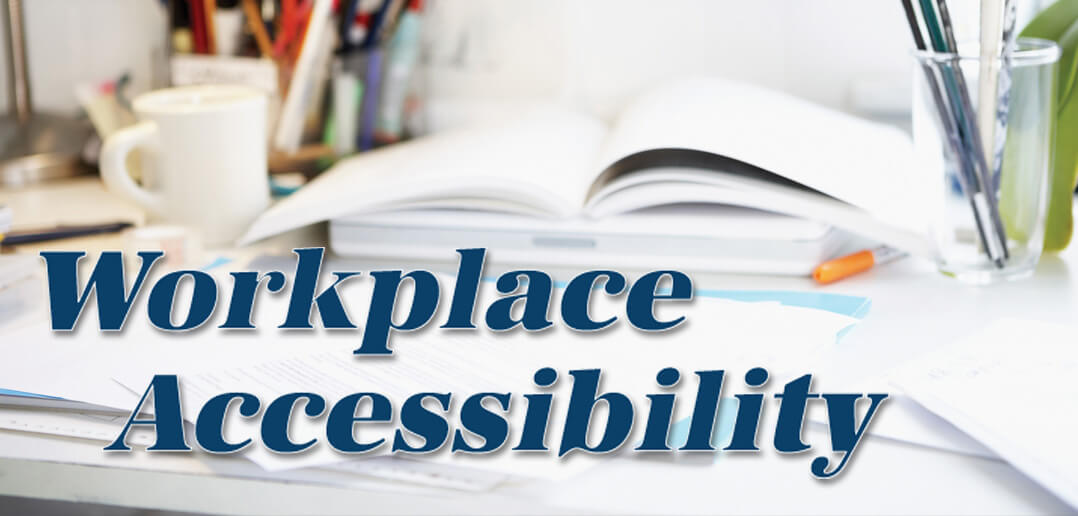Workplace Accessibilty in Omaha, NE
October is National Disability Employment Awareness Month, a time when we celebrate the many contributions of workers with disabilities. It also presents an opportunity to educate those in our community about the value of a diverse workforce inclusive of everyone’s unique skills and talents.
In an effort to promote further awareness, we consulted with several key resources: Nebraska VR, the Nebraska Commission for the Blind and Visually Impaired (NCBVI), the Nebraska Commission for the Deaf and Hard of Hearing (NCDHH), and Outlook Nebraska, Inc. (ONI).

Lindy Foley
Nebraska VR
Nebraska VR (Vocational Rehabilitation) is an employment program for people who experience a disability. Nebraska VR’s Employment and Business Services Team serves the entire state and spends the majority of their time working with local businesses to identify creative hiring opportunities for job seeking candidates. Lindy Foley, Program Director of Employment and Business Services with Nebraska VR, highlights areas in which we can all benefit from a better understanding:
“The theme for this year’s National Disability Employment Awareness Month is #InclusionWorks and this could not be more true. Building an inclusive workforce is good for business as inclusive organizations benefit from higher employee job satisfaction, lower turnover rates, higher employee morale, and access to a new customer base. The goal of inclusion is to place individuals in the world of work to live independently and enjoy the benefits and privileges that go with it; this notably includes becoming a taxpayer.
There are several commonly held myths we encounter when introducing our business services.
Myth: Hiring individuals with disabilities can create problems.
Truth: Hiring individuals with disabilities is an opportunity to foster a culture that respects the different skills and abilities of workers. Inclusion is also a vehicle to set your organization apart from competition.
Myth: Fostering an inclusive workplace is expensive.
Truth: Businesses recognize that hiring individuals with disabilities often increases moral, reduces turnover and absenteeism, while increasing productivity. In addition, businesses who hire individuals with disabilities may also be eligible to receive tax credits.
Myth: Inclusion means lowering standards.
Truth: Inclusion is about making each individual count by matching individual skills and abilities with the hiring needs of the business.
Because Nebraska enjoys one of the lowest unemployment rates in the country, businesses often find it a challenge to find qualified applicants. Many hiring managers may not know that Nebraska VR provides the services of a staffing agency with a focus on placing qualified workers who face challenges entering or re-entering the workforce. This allows businesses to tap into an underutilized pool of talent. Nebraska VR offers pre-screened qualified candidates, support with employee training and may even be able to provide a free trial employment period and other related services. Likewise, Nebraska VR may be able to help employers retain current employees who come to have a disability due to an accident, illness, injury or addiction. Sometimes this may include a workplace modification.
Businesses and hiring managers who have not yet worked with Nebraska VR or hired individuals with disabilities often experience fear of the unknown. For example, many employers, regardless of the size of organization, have questions about the costs associated with hiring individuals who experience disabilities. In reality, to meet ADA requirements there may be none. The Nebraska Assistive Technology Partnership is also a resource for identifying technology to meet the needs of individuals in the workplace. Nebraska VR works with Nebraska Assistive Technology Partnership to meet the needs of individuals to be productive at work. Services can include evaluation, design, adaptation, or technical training. Assistive technology specialists can offer recommendations for worksite modifications along with providing demonstration and trial use of assistive technology equipment.
Another concern may be that the hire comes at a cost to productivity. The fact is Nebraska VR provides job candidates with the skills and abilities to do the job. Nebraska VR is an eligibility program that helps individuals with disabilities who want to work to prepare for, find, and keep a job. Those with physical, mental, intellectual, emotional, and learning disabilities receive services to identify their strengths and abilities in order to find success in the world of work. We offer customized and individualized services that are tailored to a person’s specific needs and job goal, with the ability to provide training and the supports necessary to help our clients succeed.
Nebraska VR’s business service team can be reached by email at VR.BAM@nebraska.gov or by phone at (877) 637-3422. More information about statewide services for business and individuals with disabilities is available at www.vr.nebraska.gov.”

Carlos Servan
Nebraska Commission for the Blind and Visually Impaired
Further emphasizing the importance of being educated about all of the options available, Carlos Servan, Deputy Director of VR Services for the Nebraska Commission for the Blind and Visually Impaired (NCBVI), has also taken the opportunity to clarify a few things regarding workplace accessibility and inclusion:
“With the proper training, blind people can compete on an equal basis with their sighted peers. There are many misconceptions about the abilities of blind people. Almost everything that you do visually, you can also do non-visually. In fact, many methods that blind people use in the workplace, sighted coworkers start to use as a result of exposure. Employers commonly express concerns about safety on the job, yet there have been studies that show that blind people are actually safer on the job than their sighted counterparts. The biggest barrier that blind people face is the attitudes of the public and employers because they are not sure how a blind person would do the job. Sight is a very powerful sense that most of us rely on for the information that we take in, but a blind person has learned to effectively use their other senses to compensate.
The main issue that blind people face is accessibility, and NCBVI is available to consult with businesses and provide resources accordingly. This not only includes barriers for potential employees but also for blind customers and clients who wish to access your business’s offerings. We have highly knowledgeable technology specialists on our staff who are able to assess current conditions and make recommendations. NCBVI will purchase all equipment necessary to make your business accessible to a blind employee. Or, there may be some resources that may need to be Brailed or put into a different format. NCBVI is available to make that happen.
On the other end of the spectrum, we assist those seeking employment by helping them develop the compensatory skills that they need to be competitive in a workplace. We teach job seeking skills, develop resumes, provide job leads, and offer job coaching as needed. We provide internships and job readiness skills. We partner with businesses to work on interviewing skills and networking. Essentially we work out any accommodations that need to be made and provide those so there is little to no effort required on the part of the employer.”

Rachel Carver
Outlook Nebraska, Inc.
In agreement, Rachel Carver with Outlook Nebraska, Inc. adds, “Our goal is to show the public that, with the proper tools and the right opportunity, blind individuals have the ability to be successfully employed and carry on the daily business of life. Unfortunately, this very capable group faces a national 70 percent unemployment rate although the reality is that blind and visually impaired individuals can perform most jobs with great skill and attention to detail. Through our adaptive technology training program, our visually impaired neighbors have a chance to learn about all of the technology available at no charge to them. Together, if we can eliminate all of the misconceptions and educate our community on the truths of this often overlooked group, we can create a more inclusive workforce.
If someone comes into your office for an interview using a cane or a wheelchair, it is important to keep an open mind about their abilities. People with disabilities, or different abilities, are just as capable as their peers. They just need to be given a chance to achieve independence and upward mobility. In today’s world, there is cutting-edge technology available that makes most jobs accessible. However, many businesses are not familiar with the tools a blind person can use to perform their job duties. The more we can educate businesses about the tools and the resources available, the more inclusive they will be for everyone. Managers can lead by example in the workplace in a number of ways. Knowing how to adapt a company computer, ensuring that your building has an accessible entrance, and making your signs clear and easy to read are all simple things businesses can do to improve accessibility for everyone. Whether you are an employer or someone wanting to learn more about the services available to assist with vision loss, call us, we’d be glad to help.
Our Education and Training Center, located in our offices at 4125 South 72nd Street in Omaha, is dedicated to assisting the blind and low vision public utilize digital technology to achieve their personal life goals. Every week new apps, devices, and software are being developed to assist those with visual impairments to function more independently, and we are here to help our blind neighbors harness these tools. Individuals can arrange a free training appointment Monday through Friday from 7:00 a.m. to 8:00 p.m. by calling our training team at (402) 614-3331 Ext. 214.

John Wyvill
Nebraska Commission for the Deaf and Hard of Hearing
Similarly, John Wyvill, Executive Director of the Nebraska Commission for the Deaf and Hard of Hearing (NCDHH), provides information from yet another perspective:
“Every person with some form of hearing loss has different needs. This is why assistive technology, interpreters, a telecommunication relay service, and other options are crucial to bridge that communication gap.
Many employers do not fully understand hearing loss; since it cannot be seen it is often overlooked. It is important to remember that hearing aids or cochlear implants do not ‘make’ an individual hear; it increases their access to sound. A common thought is, ‘If I talk louder, they can understand me.’ Hearing sounds and understanding speech are two different concepts. For those who are Deaf, it is important to discuss with them what mode of communication access they prefer, whether it be a sign language interpreter present, live captioning in meetings, or a video relay service provider.
Technology is in every aspect of today’s world; and for assistive technology in the Deaf and Hard of Hearing communities, that is no different. There are many different types of equipment that can be used to accommodate not only hard of hearing and deaf individuals. Again, it is important to work with each individual to find how their needs can be met as his or her situation will be unique. The Nebraska Commission for the Deaf and Hard of Hearing has Advocacy Specialists that are willing to provide assistance with this technology as well as provide and offer training for employers and staff to make the transition smooth and most effective. The interested applicant or employee who is Deaf or Hard of Hearing typically has the role to notify what accommodation may be most effective for them to do their essential job duties. However, it is not a bad idea for an employer to bring up conversation and ask what communication access accommodations will be needed. The Commission also has developed a resource handbook for advocacy, and one of our Advocacy Specialists would be more than willing to work with an employer, employee, or applicant to help provide these services. Please do not hesitate to reach out to NCDHH, via website, e-mail or phone. We have regional offices located throughout Nebraska. To help find the closest office near you, please call us by telephone at (800) 545-6244 or (402) 471-3593, reach out by e-mail at NCDHH@nebraska.gov, or visit our website at www.ncdhh.nebraska.gov.”
Coinciding with October’s National Disability Employment Awareness Month (NDEAM), those in our community are called upon to reflect on the important role disability plays in workforce diversity. In observing the contribution of workers with disabilities and the value of a workforce that is inclusive of their skills and abilities, NDEAM is an opportune time to review business hiring practices to ensure they convey a commitment to an inclusive workplace culture. We encourage you to reach out to our local resources to find out more about what you can do in your workplace to promote accessibility for all.

